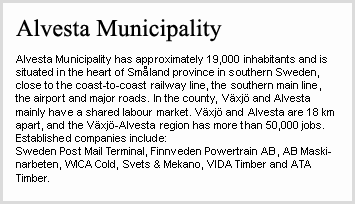
Public sector sharpens focus
How can the public sector arm itself to face a possible slump in the economy? According to Eric Rydén, Director of Alvesta Municipality, the answer is to focus on the core operation.
It has previously been said that the public sector doesn’t follow the same economic fluctuations as trade and industry, but is secondarily affected by lower income and higher costs.
“There’s a clear trend in society today whereby the two spheres are drawing closer together, and when collaboration increases, so does dependency. Consequently, the public sector is very much affected by the prevailing economic conditions,” Rydén explains.
When it comes to Sweden’s 290 local authorities and their operations, there are of course many factors to consider. The economic situation affects business in the municipality, which in turn affects citizens. Higher unemployment means less tax income, which directly hits those who need help and support.
“Municipalities are also affected by other conditions, such as demographics. A low birth rate and a reduced tendency in mobility cause growth to stop. Increasing the local population and attracting enterprise are always priorities for local authorities,” says Rydén.
The job of a local authority is to provide effective, high-quality services for its citizens. The results may be measured in terms of service provision, but that doesn’t mean that costs are not important.
Rydén explains that a recession increases pressure on productivity and efficiency.
“Compared to a private company, the operations of a local authority are more constant. We can’t simply raise taxes at short notice just because there’s a slump. That’s why we have to focus on our core operation and find alternative solutions for peripheral services, for instance.”
According to a survey by public sector periodical Dagens Samhälle, Alvesta is Sweden’s typical municipality, coming closest to the national average on 34 different criteria.
“Alvesta is very much a traditional municipality where we deal with virtually all production ourselves with our 1,500 employees. We turn over around half a billion Swedish kronor a year, have 20,000 inhabitants, and as we see it we offer excellent municipal services and enjoy good co-operation with the local business community.”
However, Rydén is not averse to thinking along new lines should the need arise.
“Increased economic pressure automatically leads to higher interest in alternative solutions, such as outsourcing particular services to private contractors or enabling employees to take over management of certain activities.”
However, this does not alter the responsibility of the local authority, but it does alter its role.
“It’s important to build up a level of expertise in procurement if an operation is to be divested. After all, the funding is the same whether or not the demands fall on an external contractor.”
Stefan Karlsson, a business developer at Coor with many years’ experience of municipal leadership from various management positions in public services, believes that local authorities have a great responsibility and face an increasingly tough time in achieving their operational goals. It will be more and more important to focus on the core operation.
“Because of citizens’ increasing demands on municipal services, those services must be cost and efficiency maximised. It will therefore be increasingly common among local authorities to outsource services to external suppliers like Coor.
“We’re professionals when it comes to service, we can take advantage of our size, professional development and control of the services we provide. We also have the advantage of being able to combine public sector and private sector deliveries, which is something municipal services alone are unable to do,” says Karlsson.
Eric Rydén also believes this development could favour local authorities.
“A greater element of external contractors heightens the demands on the public service operation. This leads to greater professionalism in the municipality.”

Facts
The public sector refers to all operations conducted for the benefit of the public. Of the 15 largest companies in Sweden, 10 operate in the public sector. National, local and county authorities jointly own 90 million square metres of premises which cost SEK 90 billion a year to own and manage. A municipality of 300,000 inhabitants turns over roughly SEK 1.5 billion a year, of which the service sector comprises around SEK 300 million.
Do you have any questions or would you like to know more?
Contact Stefan Karlsson, stefan.karlsson@coor.com or by phone on +46 8 553 959 03.
